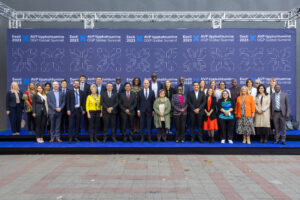The Open Government Partnership’s (OGP) unique model brings together governments and civil society organizations to initiate and implement change. This model deserves and needs to be promoted at the global and local level. Our work is even more urgent now as we face simultaneous crises.
As lead co-chairs of the OGP Steering Committee, Anabel Cruz (Founder Director of the Institute for Communication and Development in Uruguay) and the Government of Estonia (represented by Taimar Peterkop, Secretary of State of the Republic of Estonia) pledge to work on finding possibilities to make the Partnership and its emphasis on co-creation core to policy-making. We ask all OGP members to share their best practices and experiences, both successes and failures. By doing so, we can learn from each other, foster better open governance, and prove that working together with civil society benefits everyone. Furthermore, we are looking for examples of how civil society itself has played a vital role in tackling crises and supporting the efforts of governments. This call-to-action also aims to expand peer-to-peer learning and mentoring as a valuable tool for national and local members of OGP.
Our year as lead co-chairs of OGP coincides with the development and implementation of OGP’s new strategy for 2023–2028, a ‘global action plan’ for the Partnership. In developing this action plan, we will practice what we preach regarding the values of participation and co-creation. These are values that are expected of all OGP members. Today’s context has greatly shifted from what it was when OGP was founded 11 years ago. We have an opportunity to shape a refreshed strategic vision that ensures OGP’s role and contribution remain relevant. This vision will build on current positive outcomes and documented research showing that the OGP model works. This vision will also take into account the significant challenges we have seen in implementing open government practices and threats to democracy. These threats have been demonstrated by the continued attacks on civil liberties, deteriorating security situations, and geopolitical instability, including the war in Ukraine. As co-chairs, we will bring leadership to the new strategic direction, contributing to the development of the OGP strategy as well as mobilizing the broader Partnership to participate in the process. This leadership role will help secure political support for OGP’s new direction.
In 2023, the 8th OGP Global Summit will take place in Tallinn, Estonia. This event will be the first in-person global convening of OGP since 2019. In Tallinn, we will gather our vibrant and diverse community of stakeholders who champion open government and democracy in all regions of the world. This is a moment to re-energize the community and showcase the added value of the Partnership in addressing the biggest challenges of today and tomorrow.
We believe that Estonia, a vibrant and tech-savvy democracy, and Anabel Cruz, a voice of the global civil society community,will bring diverse perspectives for the OGP strategy process, and will use the lessons shared from our call-to-action to promote and institutionalize OGP’s core principles internationally.
As co-chairs, our priorities will be to:



